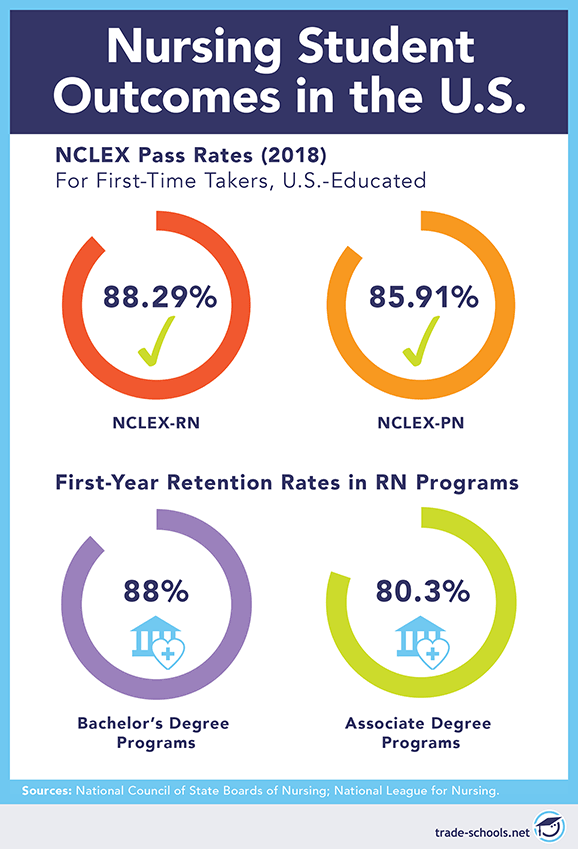How Hard Is Nursing School? Look at the Facts
Talk about a popular question. Asking, "How hard is nursing school?" puts you in the company of thousands of other people who wonder the same thing every year. After all, nurses are in high demand, and they tend to get paid well. But becoming a nurse requires going to school and getting licensed. And that takes commitment.
So, is nursing school hard? That depends on whom you ask. Most nursing students would probably tell you that their programs are, at the very least, challenging. However, they want and expect to be challenged. They understand that, as future nurses, they will be counted upon to know what they're doing.
But everyone has a different perspective. For a lot student nurses, school is a rewarding mixture of hard work, fun, and supportive camaraderie. It's where they discover what they're really capable of achieving. And it's where they start growing into the kinds of professionals who earn respect, admiration, and countless opportunities to be angels in other people's lives.
Learn much more by exploring these sections:
- Facts about nursing school that might surprise you
- Is it hard to get into nursing school?
- How hard is it to become a nurse? (What are the common challenges of school?)
- Does going to a vocational school make it easier to complete a nursing program?
- How difficult is the nursing licensing exam?
- 19 essential tips for getting through nursing school successfully

Facts About Nursing School That Might Surprise You
 When people ask, "Is it hard to become a nurse?" they are often most concerned about the schooling part of the process. That's normal. But the encouraging reality is that most students who are accepted into nursing school are successful at making it all the way through their programs. In fact, looking at the student-retention rates of nursing programs might be one of the best ways to ascertain how difficult they are.
When people ask, "Is it hard to become a nurse?" they are often most concerned about the schooling part of the process. That's normal. But the encouraging reality is that most students who are accepted into nursing school are successful at making it all the way through their programs. In fact, looking at the student-retention rates of nursing programs might be one of the best ways to ascertain how difficult they are.
According to a National League for Nursing study, the national dropout rate for nursing programs was 20 percent. While the attrition rate is higher for some bachelor's degree nursing programs, most people in school to become registered nurses (RNs) stayed in school and pushed through.
But what is most surprising (and reassuring for potential nursing students like you) is this fact: Those rates were well above the nationwide average for all college and university programs at those levels. (Overall, only a little over 60 percent of U.S. undergraduate students in two-year programs stayed in school. And the retention rate for undergraduates in four-year programs was closer to 70 percent.)
So, compared to students in many other areas of study, relatively few nursing students decide to quit. That doesn't mean nursing school isn't challenging. But it does mean that learning how to become a nurse might not be as difficult as many people believe.
Is It Hard to Get into Nursing School?
That depends on several factors. So there is no simple answer. But aspiring nurses now have more educational options to pursue than ever before. If one school proves difficult to get into, then chances are good that you'll have other schools in your region that are worth looking into.
The main thing to keep in mind is that every nursing school has its own admissions policies. And those policies can vary substantially from school to school. That's why, depending on your particular situation, you'll likely have better success getting into some schools than others. Here's what you may or may not encounter when applying:
- Competition: Because of the large demand for nurses in America, this field attracts a lot of people who want to get training for it. In fact, according to the American Association of Colleges of Nursing, over half of all healthcare students in the U.S. are in nursing programs. But in some regions of the country, there are many more applicants than seats within the available programs. As a result, you might face some competition for one of those seats, especially at schools that have a reputation for being very selective. So things like your high school or college grade point average (GPA) might become extra important. At some selective schools, you may need a cumulative GPA of 3.0 or higher.
- Testing: Most nursing schools require applicants to pass an exam that measures basic academic skills in subjects like math, English, reading comprehension, and science. Exams that are popular with many schools include the Test of Essential Academic Skills (TEAS), the Nursing Entrance Test (NET), the HESI Admission Assessment Exam, and the Wonderlic SLE (Scholastic Level Exam). Some schools will also accept recent SAT or ACT scores that are above a certain level. So how hard is the nursing entrance exam? It shouldn't be too difficult as long as you remember a lot of the basic stuff that you learned in high school. And you can always get some practice tests and review materials to prepare for it ahead of time.
- Prerequisite requirements: At public colleges, you may need to complete a few basic courses before applying to a nursing program. Those courses are usually in subjects like anatomy, physiology, microbiology, and medical terminology. However, most private career colleges don't have this requirement. Instead, they include all of those basic courses as part of their nursing programs.
- Background checks: Applicants at some nursing schools need to pass a drug test and criminal background check before they can fully qualify for a program.
- Waiting lists: The nursing programs at many public and community colleges have waiting lists that can be as long as two to three years. But at most private career, vocational, and technical schools, you can begin your program very soon after being accepted.
Are you an older student who thinks that your age might make it difficult to get into nursing school? Think again. According to the National League for Nursing study, people above the age of 30 account for:
- About 37 percent of students in practical nursing programs
- Over 40 percent of students in Associate Degree in Nursing (ADN) programs
- Roughly 18 percent of students in Bachelor of Science in Nursing (BSN) programs
- About 60 percent of students in Master of Science in Nursing (MSN) programs
How Hard Is It to Become a Nurse? (What Are the Common Challenges of School?)
Every nursing student perceives and experiences his or her training a little differently. But like any other field of study, this path certainly requires enthusiasm and dedication. And it can involve common challenges, which can often be overcome by following a few essential tips for success. Here are some of the most frequently cited issues by nursing students:

- The amount of stuff to learn: Some people say that nursing school is hard because it requires you to learn a large volume of new facts, terminology, concepts, and practical skills. But other people enjoy this aspect of the training. They even thrive on it because they simply love learning and growing.
- Few absolutes: Nurses use their intelligence in more ways than many people realize. As a student nurse, you eventually discover that a problem can have many correct solutions. Yet the real challenge comes in selecting the "most correct" solution. So you need to learn how to develop good deductive reasoning skills, especially for some tests that require you to choose the best answer from a list of options that might all be technically correct.
- Time management: Nursing programs usually require students to spend a lot of time on their studies inside and outside the classroom. In addition, the training involves a significant time investment in skills labs and clinical settings. So some students need extra support in figuring out how to balance their training with other areas of their lives. But help and guidance are often available to those who ask for it.
- Nervous excitement: The practical side of nurse training includes plenty of opportunities to practice and demonstrate important technical skills in front of instructors and other students. And those moments can sometimes make you feel eager and anxious. But they can also make you feel truly alive and focused.
- Profound topics and intense situations: A nursing education will expose you to a lot of mature subjects since the job of a nurse is often to help care for people who are sick, injured, or dying. And nurses put their patients first. So the emotional side of the training can be significant. But that's also where a lot of the rewards come from. With practice, you can learn how to manage your feelings, reflect on your values, and channel that energy toward the healing and therapy of patients.
Does Going to a Vocational School Make It Easier to Complete a Nursing Program?
For some nursing students, it can make a positive difference. It depends on your individual needs and abilities as well as on the particular school and program you choose. A career college or technical or vocational school in your area may have higher student retention rates and better outcomes for graduates who take the NCLEX exam than traditional four-year schools or community colleges in your region. So, it's a smart idea to see if the board of nursing in your state has that kind of information to help you choose a vocational school.
Some of the potential advantages of attending a vocational school for your nursing education include:
- Flexible or more convenient class times: Many vocational schools offer a choice of day, evening, weekend, or online classes. Having those kinds of options can be especially helpful if you have work or family obligations.
- Less commuting time: Vocational schools often have more convenient locations than other types of colleges. As a result, you may not have to travel as far to attend class.
- Smaller class sizes: Nursing students who attend vocational schools frequently benefit from more personalized attention from instructors.
- Extra support for adult students: A lot of vocational schools aim to provide a supportive environment for non-traditional students who may have other big commitments outside of school or who need extra mentorship, group support, or help with their academics.
Are you curious about the options in your area? Find nearby vocational schools that offer nursing programs so that you can learn more about their advantages and get started with your education.
How Difficult Is the Nursing Licensing Exam?
After completing an accredited nursing program, you should be in good shape for the last major step in becoming a professional nurse. In fact, pass rates in the U.S. for first-time takers of the National Council Licensure Examination (NCLEX) tend to be fairly high. According to the National Council of State Boards of Nursing, in 2025:
- Over 88 percent of first-time takers who were educated in the U.S. passed the NCLEX-RN, which is the exam for becoming a registered nurse.
- Over 86 percent of first-time takers who were educated in the U.S. passed the NCLEX-PN, which is the test for becoming a licensed practical or vocational nurse (LPN or LVN).
So most nursing graduates are successful on their first attempts. And even if you don't pass the first time around, you can always try again later. Plus, many review materials are available that can help you prepare for the exam. Some schools even offer NCLEX review courses.
19 Essential Tips for Getting Through Nursing School Successfully
Nursing school is a challenge, but you're probably more capable of taking it on than you think. And you can greatly boost your chances of success by learning from people who have already discovered how to make the experience easier. That way, you can stop asking, "Is becoming a nurse hard?" Instead, you can start asking, "What will help me attain the goals that I know I can achieve?"
Here are several suggestions that can make nursing school easier:
- At the start of each course, use the syllabus to mark all upcoming assignments and tests on your calendar.
- Do as many assignments as you can ahead of time so that you can save time later and feel more relaxed.
- Use your calendar to plan a few days off from your studies now and then. Spend that time relaxing or having fun with friends or family.
- Make an achievable to-do list each day and stick to it.
- Maintain a friendly but professional relationship with all of your instructors since they can be terrific mentors and references.
- Minimize any time-consuming social involvement with classmates that might hamper your focus on your studies.
- Always do any required reading before your day's classes so that you'll know what doesn't make sense to you and will be able to ask the right questions while in class.
- Get to each of your classes 10 to 15 minutes early, especially the clinical ones. That way, you'll have time to review and organize your materials while focusing your thoughts on what's immediately ahead.
- Never be afraid to ask a question, no matter how silly you think it might be. Many of your classmates will likely be wondering the same thing.
- Focus on trying to learn and understand the material to the best of your ability rather than on getting perfect grades. All you need to do is pass.
- Plan regular study sessions with some of your classmates. And practice teaching each other what you're trying to learn.
- Seek the help of a tutor for any classes that are particularly difficult for you.
- Avoid comparing your grades or test results to those of your classmates. Keep your focus on your own goals and milestones.
- Practice your hands-on clinical skills at every opportunity you get, even if that means volunteering for projects or getting permission to use your school's lab facilities during off-hours.
- Stay observant so that you get good at noticing any small clues or details that might be relevant to your clinical performance and development.
- Avoid taking criticism personally. Mistakes help you grow. And as a nurse, you'll often be helping people who aren't capable of being their best selves in the moments you care for them.
- As you near the end of your program, get some NCLEX review books and practice a few questions from them each day.
- Stop from time to time and reflect on how far you've already come. And pat yourself on the back each time you do something right.
- Find reasons to laugh every day. Becoming a nurse involves plenty of humorous moments if you're open to discovering them.
Why It's All Worth It
 Is it hard to become a registered nurse or get into practical nursing? For some people, maybe it is. But that doesn't mean it will be for you. After all, when your heart is truly set on achieving something, then challenges just become rewarding parts of the journey.
Is it hard to become a registered nurse or get into practical nursing? For some people, maybe it is. But that doesn't mean it will be for you. After all, when your heart is truly set on achieving something, then challenges just become rewarding parts of the journey.
Plus, nurses know that they make an important difference in all of the lives they touch. Few other lines of work are so noble. That's why graduating from nursing school might be one of the most fulfilling moments of your whole life. It's a monumental accomplishment and the beginning of a satisfying and worthwhile path, along which you may discover more about yourself and the human spirit than you ever thought possible. Most of today's nurses, if given the chance to go back in time, would choose nursing school again in a heartbeat.
And if those reasons aren't enough to convince you not to be deterred, then remember these benefits:
- Great pay: It's no secret that many nurses make good money. According to the Occupational Employment and Wage Statistics program, the median salaries of practical nurses, registered nurses, and nurse practitioners in the U.S. were $48,070, $77,600, and $123,780, respectively, in 2021.*
- Outstanding job outlook: By becoming a nurse, chances are good that you'll always be able to find employment. In America, the demand for qualified nurses is strong year after year. According to employment projections from the Bureau of Labor Statistics, the number of jobs for registered nurses, practical nurses, and nurse practitioners is expected to grow by 6, 6, and 40 percent, respectively, from 2021 to 2031.* That equals a total of more than 349,400 annual openings over that period.
- Terrific advancement potential: No matter which level of nursing you begin at, you can pursue opportunities to move up with additional education. For example, an LPN or LVN can become an RN. And an RN with an ADN degree can go after a BSN degree. Many bridge programs are available, such as LPN-to-BSN and RN-to-BSN programs. Plus, many RNs get the chance to pursue MSN degrees, which can open up additional career options (such as the opportunity to ask, "Is it hard to become a nurse practitioner?" and to discover the answer for yourself).
Ready to Rise to the Opportunity?
Nursing schools throughout the country are accepting applications right now. But they also welcome the chance to share more information with potential nursing students like you. Find options in your region by entering your zip code in the following search tool today!
* Unless otherwise noted, salary information is based on May 2021 data from the Occupational Employment and Wage Statistics (OEWS) program. Job growth and average yearly openings estimates are from the Bureau of Labor Statistics and are for the 2021 to 2031 period.




